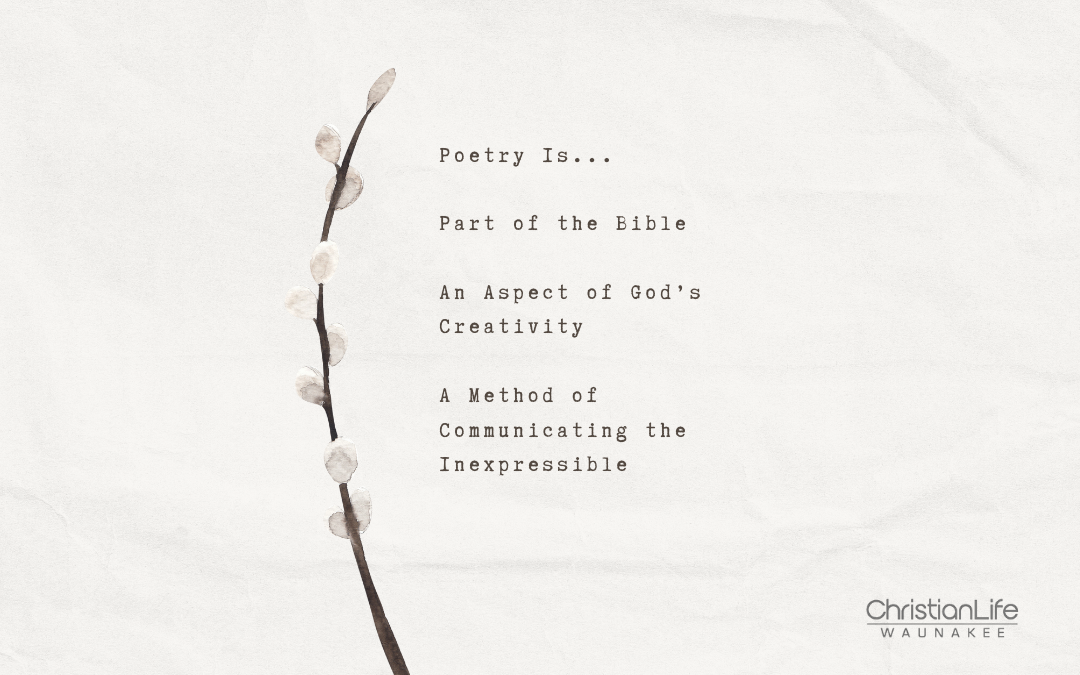Did you know that around one-third of the Bible is poetry? Whole books of the Bible are entirely written in verse, including Job, Psalms, Proverbs, Ecclesiastes, and Song of Solomon. Many other books, from Genesis to Revelation, also contain poetry within their pages. April is National Poetry Month, a perfect time to study how poetry helps us understand God the poet.
Poetry is difficult to define. One definition of poetry is writing that has meter: a rhythm or regular pattern of syllables. However, not all poetry has a formal structure. Some poems rhyme, but not all. Another feature of poems is imagery, such as metaphors, similes, and creative expressions. Most importantly, a poet carefully crafts words with sounds and meanings to express some emotion or idea in a beautiful and creative way.
Poetry Is Part of the Bible.
Understanding poetry can aid us in our study of God’s Word. For example, Psalm 119, the longest chapter in the Bible, is an acrostic poem. Each set of verses in the psalm begins with a letter of the Hebrew alphabet. When we understand the poetic structure of the psalm, we realize it’s not just an extremely wordy chapter. We can see that it was structured this way for a specific purpose to communicate something important. Since so much of the Bible is made up of poetry, we can engage more deeply in our reading of it when we look at how God used poetry to communicate with us.
Poetry Is an Aspect of God’s Creativity.
Creativity is a gift from God, part of God’s nature, and an aspect of bearing His image. When we write, build, design, or invent, we imitate just a tiny bit of God’s creativity. He created amazing and intricate creations that are not just functional but stunningly beautiful. Think of butterflies. Their bright coloring helps them avoid predators, but it is also lovely and unique. He could have given them different protection, but He chose to make them beautiful to look at. Similarly, He could have used whatever means He wanted to bring His Word to us through the human authors of the Bible, but He chose poetry.
Poetry Is a Method of Communicating the Inexpressible.
Poems can express what can’t be expressed in prose. Sometimes, words aren’t enough to describe deep emotions or mind-boggling truths. But where prose fails, poetry often succeeds. Poetry frequently has a reputation of being either sugary and corny or unnecessarily dense. Many of us tend to prefer more direct communication, and poetry takes concentration and rereading to grasp fully. However, it makes sense that a book describing God’s awesome power and being, thousands of years of human history, and God’s relentless love for sinful people should use poetry to communicate these overwhelming concepts.
Poetry Month Challenge
Understandably, poetry isn’t everyone’s cup of tea. Happily, there are many other kinds of writing and creativity that God has given us. However, if poetry’s not normally your thing, maybe this is the month to give it a chance. Knowing how to read and engage with poetry can make studying the Bible even more enriching. Consider exploring some of the poetry of the Bible this month or reading other poems for fun.
If you’re poetically inclined, or even if you’re not, trying your hand at writing a poem can be helpful in understanding poetry even better. Practice playing with words and ideas, and have fun with it! I often have trouble with creative writing because I’m afraid it won’t be any good. I’m not a poet, but I’m challenging myself to write a poem each day this month. They can be messy, amateur, and corny poems because most of them will probably stay just between God and me. But I think writing and reading poems can help us express the inexpressible, process deep emotions, learn how to appreciate the poetry of the Bible better, and understand God the Poet.
—————————————————

